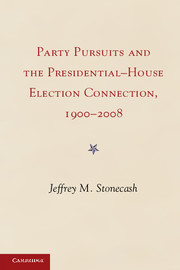Book contents
- Frontmatter
- Contents
- Preface
- Part I Election Patterns and INTERPRETIVE Frameworks
- 1 Disconnecting and Reconnecting Presidential–House Election Results
- 2 The Study of Presidential–House Elections
- 3 Reconsidering Conclusions
- 4 Explaining Change
- Part II Explaining a Changing Relationship
- Appendix I Presidential–House Elections by House Districts
- Appendix II The Presidential–House Relationship and Uncontested Races
- Appendix III Alternative Explanations of Change
- Bibliography
- Index
- References
3 - Reconsidering Conclusions
A Critique
Published online by Cambridge University Press: 05 January 2013
- Frontmatter
- Contents
- Preface
- Part I Election Patterns and INTERPRETIVE Frameworks
- 1 Disconnecting and Reconnecting Presidential–House Election Results
- 2 The Study of Presidential–House Elections
- 3 Reconsidering Conclusions
- 4 Explaining Change
- Part II Explaining a Changing Relationship
- Appendix I Presidential–House Elections by House Districts
- Appendix II The Presidential–House Relationship and Uncontested Races
- Appendix III Alternative Explanations of Change
- Bibliography
- Index
- References
Summary
In recent decades analyses of the relationship between presidential and House election results were largely set aside to examine the factors affecting House elections and why incumbents were increasingly safe. There are, however, fundamental problems with the premises underlying the focus on House elections in isolation and with the resulting neglect of the presidential–House election connection. One involves the relevant evidence about incumbents, and the other involves doubts about the candidate-centered framework that has dominated analyses.
First, with regard to the evidence, two matters are important. The empirical evidence about an increased incumbency effect does not indicate what is generally presumed. There is also accumulating evidence that the relationship between presidential–House results is gradually returning to its prior levels. It appears that something sustained and systematic is increasing this relationship in recent decades.
- Type
- Chapter
- Information
- Publisher: Cambridge University PressPrint publication year: 2012



